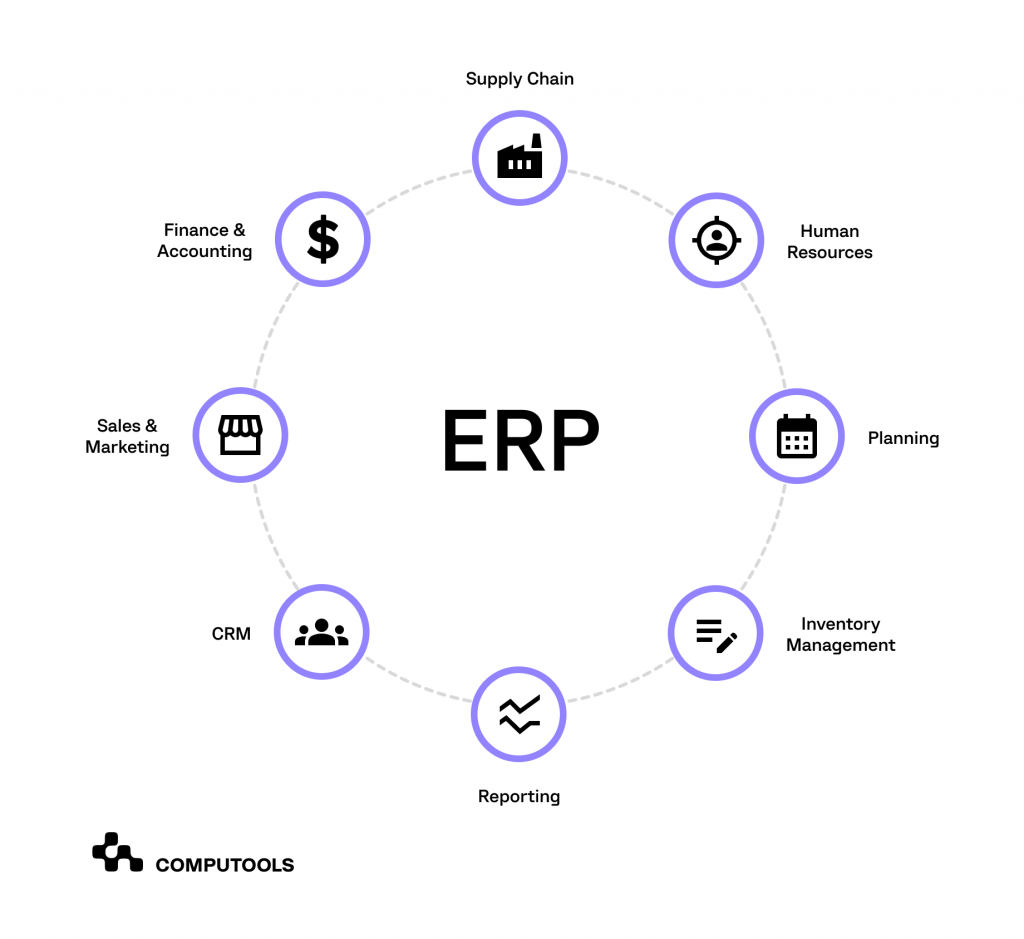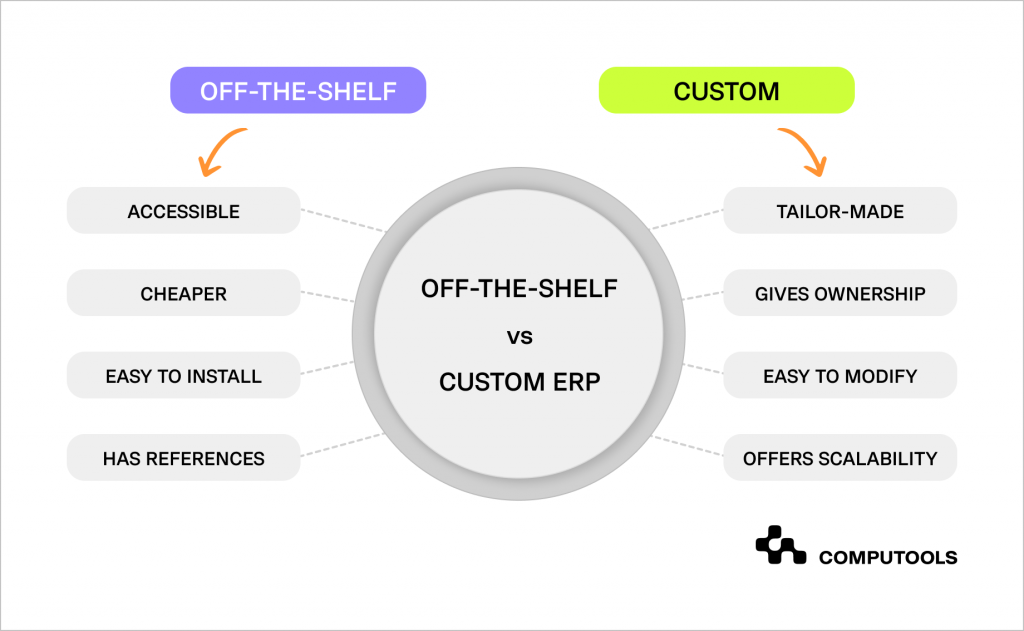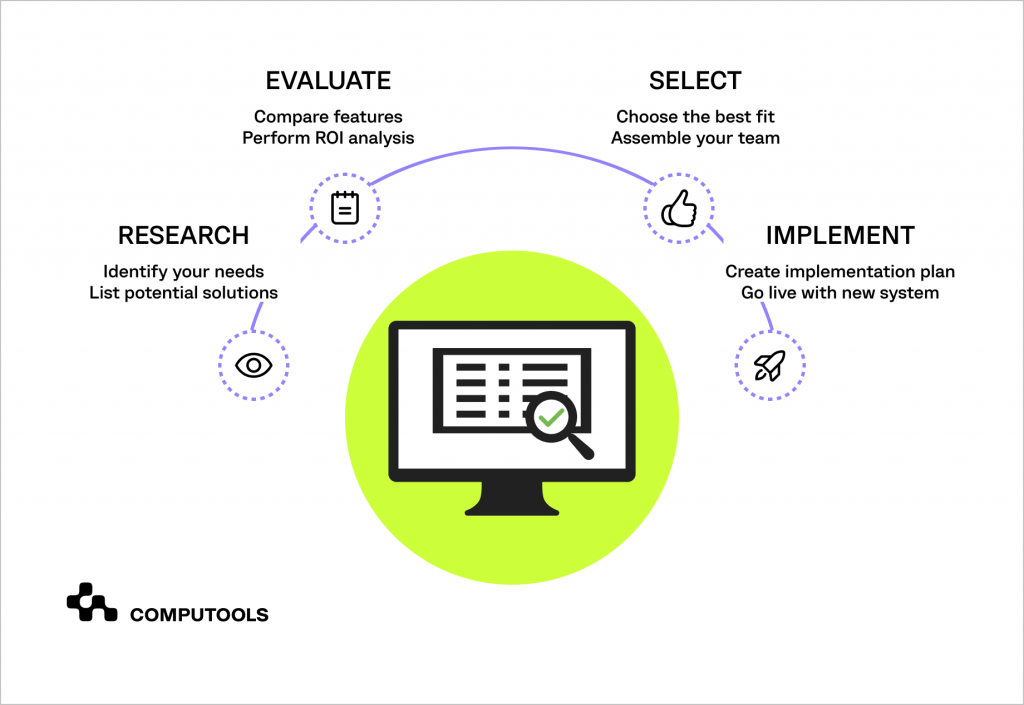Today, ERP systems are a must-have for businesses seeking to automate their operations and streamline their work processes.
However, implementing ERP software requires a significant financial investment, complicating the decision-making process.
This is especially true when owners have to decide whether to opt for an off-the-shelf ERP solution or a custom-designed system tailored to their needs.
In this article, we’ll compare two types of business ERP software and offer some tips to help you make a well-informed choice.
What is an ERP system?
ERP, short for enterprise resource planning, includes extensive software applications designed to manage various critical business functions such as accounting, supply chain management, project and service management, manufacturing, sales and regulatory compliance.
Originally, ERP systems were mainly used by manufacturing and distribution firms due to their significant involvement in supply chain processes.
Over time, these systems have evolved from specialised supply chain software into comprehensive solutions that address the broader accounting and financial needs of all types of businesses.
Why are ERPs so important for businesses?
If your business is in the market for a new ERP solution, it may be because you’ve outgrown basic accounting software or your current ERP system can no longer keep pace with your company’s growth. This is where the value of an ERP system becomes evident.
The primary advantage of ERP software is its ability to integrate vital data from various departments of a company into a single, centralised system.
This reduces the need for manual data entry and ensures that all business information is easily accessible to everyone in the enterprise.
According to a report by Statista, spending on enterprise software worldwide reached US$913 billion in 2023, indicating a growth of 12.4% from 2022.
Additionally, a study by Strategic Market Research found that about 47% of companies worldwide are using business ERP software.
Many industries benefit from custom ERP Software Engineering, with certain sectors finding it particularly advantageous.
These include manufacturing, distribution, construction, business services, healthcare, automotive, transport and logistics and telecommunications. We’ll explore this in more detail later in the article.

Key Benefits of ERP Systems
ERP systems offer extensive advantages that vary in impact across industries.
Some fundamental benefits include:
• Process Optimisation: ERP systems automate and simplify numerous business operations, reducing manual labour.
• Unified Data Management: They create a centralised data repository, promoting data accuracy.
• Enhanced Operational Efficiency: ERP systems eliminate repetitive tasks and facilitate improved communication.
• Better Decision-Making: Immediate access to data and analytical insights supports more accurate and timely decision-making, critical for business expansion.
Two Types of ERP Solutions
You have two main choices when it comes to ERP solutions: a fully customised ERP or a ready-made solution.
The choice between these two types of ERP system will largely depend on your business’s specific needs, including your requirements for customisation, how quickly you need the system up and running and your budget for the ERP system.
Let’s explore further the distinctions between a custom and an off-the-shelf ERP solution.
Off-the-Shelf ERP Solutions
Ready-made ERPs are pre-built software, offered by numerous suppliers as readily available software packages on a subscription model.
These solutions are designed to meet diverse requirements across businesses and sectors, streamlining the selection and deployment process.
Companies with straightforward operational structures or those needing minimal customisation find a ready-made ERP solution ideal, as it’s crafted with consideration for industry best practices and conventional processes.
Applicability Across Industries
1. Automotive
The automotive industry involves complex supply chains that are common across many companies.
Off-the-shelf ERPs are well suited to handle the standard requirements of manufacturing and distribution without the need for extensive customisation.
2. Retail
Retail businesses, especially those with fluctuating inventory levels and seasonal demands, need scalable solutions.
Off-the-shelf ERPs come with built-in scalability features that can easily adapt to business growth or seasonal changes.
3. FoodTech
The quicker implementation and lower upfront costs of off-the-shelf ERPs allow food companies to achieve a faster return on investment, an important consideration for businesses in this competitive sector.
Advantages and Disadvantages of Off-the-Shelf ERPs
Advantages
• They are generally more budget-friendly than custom-built solutions.
• They provide pre-configured modules and features right out of the box.
• They enable businesses to expand their operations without significant setbacks due to the key advantage of scalability.
Disadvantages
• They impose constraints in terms of customisation, making it challenging to align the system with the business’s workflows.
• They necessitate additional training for employees, presenting an adaptation challenge.
• They suffer from limitations with the provided features and functionalities, potentially leading to gaps that impact operations down the line.

Computools
Software Solutions
Computools is an IT consulting and software engineering company that delivers innovative solutions to help businesses unlock tomorrow. Our clients represent a wide range of industries, including retail, logistics, finance, healthcare, and others.
Custom ERP Solutions
Custom ERP systems, as the name suggests, are specialised software programs designed from scratch to meet the specific requirements of a company.
These systems can be precisely adjusted to work with existing platforms, taking into account day-to-day operations and the unique aspects of your industry.
By offering tailored solutions, custom ERPs provide benefits that apply to almost any industry.
Applicability Across Industries
1. E-commerce
E-commerce includes a wide array of activities, from retail operations to handling online sales channels. A custom ERP system can be crafted to integrate these diverse components.
Also, custom solutions offer flexibility important for e-commerce platforms, especially in handling large transaction volumes and customer data, which off-the-shelf ERPs might not adequately address.
2. Healthcare
The healthcare industry deals with critical and sensitive information and requires precise and efficient management of tasks like appointment scheduling, medical supply inventory, patient records and billing.
The specificity of custom solutions enables a more holistic approach to managing healthcare facilities, addressing nuanced demands that generic off-the-shelf solutions may not fully meet.
3. Manufacturing
Custom-built ERP Solutions integrate seamlessly with existing manufacturing processes and machinery, offering detailed analytics and supporting unique manufacturing methodologies.
Off-the-shelf ERPs may lack the necessary depth of customisation required for complex manufacturing operations.
Advantages and Disadvantages of Custom ERPs
Advantages
• They allow full control over the product.
• They deliver exceptional flexibility and adaptability.
• They facilitate a better position in the competitive landscape of the industry.
• They provide the ability to scale and adjust the ERP as needed.
Disadvantages
• They entail higher initial costs, leading to greater development expenses.
• They focus on extensive customisation, which can lead to longer timelines for development.

Key Factors in Choosing an ERP Solution for Business
When evaluating potential ERPs, you have to consider several critical factors to ensure the best fit for your business needs.
1. Business Process Compatibility
Off-the-shelf ERPs: Designed for a wide audience, these systems may not fully address the unique needs of specific businesses, possibly leading to functionality gaps or unnecessary complexity.
Custom ERPs: Enable businesses to meet their distinctive requirements comprehensively, particularly important for sectors with intricate, specialised operations.
2. Deployment Speed
Off-the-shelf ERPs: Come with ready-to-use modules for rapid implementation, using established practices for a smooth and predictable set-up.
Custom ERPs: Involve a longer set-up period due to the need for from-scratch development or ERP customisation, including the testing phase.
3. Financial Considerations
Off-the-shelf ERPs: Generally offer lower initial investment costs under a subscription model, though additional expenses may emerge for ongoing maintenance and support.
Custom ERPs: Entail higher upfront investment but may lead to reduced operational costs over time, reducing dependency on external software.
4. System Integration
Off-the-shelf ERPs: Provide standard integrations for widely-used applications, benefitting less tech-savvy businesses.
Custom ERPs: Custom-built ERP Solutions feature adaptable APIs and the ability to integrate smoothly with essential business and third-party systems.
5. Future Growth Support
Off-the-shelf ERPs: Scalability is often available but might incur extra costs, particularly when adding more users.
Custom ERPs: Allow for strategic scalability planning, aligning with specific business expansion goals without unforeseen expenses.
6. Data Protection
Off-the-shelf ERPs: With a ready-made ERP solution, security is a shared responsibility, with the vendor focusing on system security. Vendors invest in protective measures and updates.
Custom ERPs: Businesses must implement bespoke security strategies to mitigate unique risks.
Decision-Making Process: Weighing the Options
To arrive at an informed decision regarding a custom or off-the-shelf ERP solution for business, follow these steps:
1. Examine Your Business Operations
Start the process by thoroughly assessing your current business operations. Identify areas where inefficiencies, isolated data, or operational obstacles may exist to determine the necessary functionalities in an ERP system.
2. Define Your Business Goals
Outline your strategic goals for the next five years. Whether focusing on growth, international expansion, or improved customer service, your objectives will shape the type of ERP system required.
3. Evaluate Future Needs
Stay updated on the latest technology trends in customised ERP software, including AI integration, cloud computing and IoT connectivity.
Consider not only your present needs but also potential future requirements. Opt for an ERP system that is scalable and adaptable to evolving technologies.
4. Assess Your IT Infrastructure
Evaluate your existing IT infrastructure to understand how a new ERP system will integrate with it. Take into account factors such as hardware, cybersecurity, existing applications and network capabilities.
5. Engage Stakeholders
Involve various stakeholders, including management, IT staff and end-users, to gather insights into their expectations from an ERP system to guarantee that the selected system meets their diverse needs.
6. Consider Industry-Specific Requirements
Confirm that the chosen ERP system is adaptable to the specific needs of your industry. This may involve compliance with industry standards or integration capabilities.
7. Budget and ROI Analysis
Determine your budget for ERP implementation and conduct a thorough return on investment (ROI) analysis.
Consider the initial costs and long-term expenses. An ERP system should be a cost-effective solution that promises a realistic ROI.
8. Seek Expert Consultation
Finally, consider consulting with ERP experts or IT consultants. Computools’ engineers with subject matter expertise can offer valuable insights into the best practices in Software Engineering and the potential pitfalls to avoid in your industry.
Choosing the Right Partner for Custom ERP Development
Selecting the right IT service provider for custom ERP Software Engineering is a critical choice that profoundly impacts the outcome of your project.
Here are key steps and factors to consider when selecting the ideal partner.
1. Specify Your ERP Requirements
Before you start your search, define what you need from an ERP system. Think about business processes, pain points and the goals you want to achieve with the ERP solution for business.
Having a clear understanding of these factors will help you find a provider that can meet your expectations.
2. Explore Potential Providers
Start your search by exploring potential providers, especially those with a robust track record in ERP Software Engineering and experience in your industry.
Study client testimonials and their overall industry reputation.
3. Consider ERP Solutions and Technologies
Examine the ERP solutions and technologies used by the provider. Ensure they leverage technologies that can future-proof your business.
Verify that their solutions are scalable, flexible and compatible with your existing systems.
4. Assess Implementation Strategy and Support
Understand the provider’s approach to ERP implementation. A reliable provider should present a clear strategy, including deadlines, project management strategies, maintenance and support.
5. Check Customisation Capabilities
If your business requires specific functionalities, evaluate the provider’s ability to customise their ERP solutions.
Customisation plays a key role in ensuring the ERP system aligns with your unique processes.
6. Review Pricing and Contract Terms
Study the pricing structure and contract terms, ensuring clarity about costs, including any hidden fees.
7. Request References and Conduct Due Diligence
Seek references and engage with current or past clients to gain insights into their experiences with the provider.
Conducting due diligence provides valuable information about the provider’s reliability and the quality of their service.
Computools has extensive experience as an ERP development partner, having worked with numerous satisfied clients across various industries. Check our case studies to discover more.

Final Thoughts
When deciding on an ERP system, think about whether a custom-made solution or a ready-to-use package better matches what your business aims to achieve.
Picking the right ERP partner is highly important because the right choice can boost your business’s efficiency, save money and help you make smarter decisions, all of which can contribute to your company’s growth and success in the long run.
If you wish to craft a perfect ERP system tailored exclusively to your business needs, please drop us an email at info@computools.com.









“Computools was selected through an RFP process. They were shortlisted and selected from between 5 other suppliers. Computools has worked thoroughly and timely to solve all security issues and launch as agreed. Their expertise is impressive.”